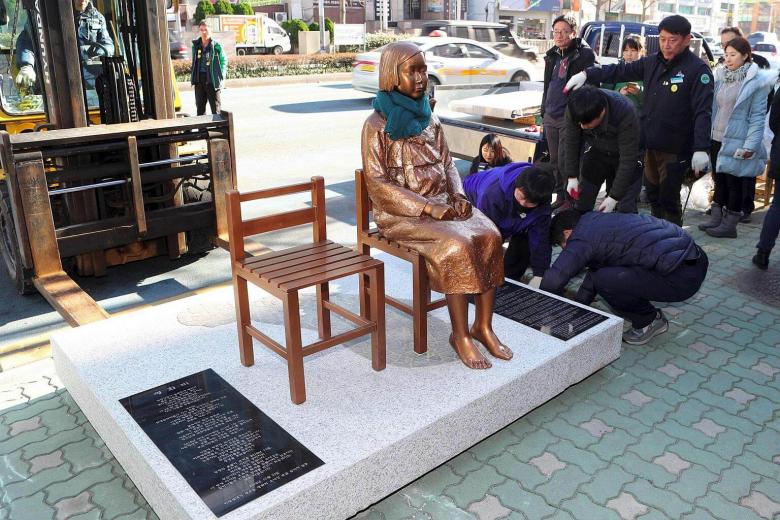In its editorial on Jan 6, The Yomiuri Shimbun criticises the installation of a statue symbolising comfort women in front of the Japanese Consulate General, in South Korea's southern city of Busan.
An illegal act, which would undermine relations with Japan, has been pushed through in South Korea in the midst of that country's political turmoil. This is a grave situation.
A South Korean civic group has installed a statue of a girl symbolising the so-called comfort women on a public road in front of the Japanese Consulate General in the country's southern city of Busan. The local municipality initially tried to prevent the erection of the statue because it would violate a law on roads, but changed tack to allow the installation, yielding to protests from the group and other organisations.
It is questionable that the South Korean government has not clarified its position on the issue, saying that it is a matter to be judged by a local government.
President Park Geun-hye has been suspended from office over a scandal involving an acquaintance's intervention in state affairs, and Prime Minister Hwang Kyo Ahn is serving as acting president instead. The South Korean government should maintain at least the minimum level of diplomatic order.
The Japanese government has lodged a protest with Seoul and demanded removal of the statue, arguing its installation breaches the Vienna Convention on Consular Relations. The convention obliges a receiving state to protect the peace and dignity of consular organisations of a sending state.
A matter of serious concern is that the latest setting up of the statue runs counter to the spirit of the deal reached between Japan and South Korea in late December of 2015 on the comfort women issue.
The deal calls for South Korea to establish a foundation for the support of former comfort women and for Japan to provide one billion Yen (S$12.3 million) to the foundation. The deal confirmed a "final and irreversible resolution" to the issue. Regarding a statue of a girl installed in front of the Japanese Embassy in Seoul, the removal of which has been demanded by Japan, South Korea pledged to strive toward an appropriate solution.
Despite that, the new statue has been erected in Busan, a regrettable development.
Based on the fund provided by Japan, the foundation reportedly has provided 100 million won (S$120,000) each to 29 of the 46 former comfort women who were confirmed alive at the time when the deal was signed. But this fact has not been sufficiently reported in South Korea.
It cannot be overlooked that leading figures aiming for presidential election from the opposition camp, which has seized the initiative in controlling the political situation, have insisted on renegotiating the bilateral deal. They openly endorsed the installation of the statue in Busan. They are suspected of trying to inflame anti-Japan sentiment.
The foundation's project has progressed so far that the deal is irreversible and there is no room for renegotiations. Hwang has said it is hoped that continuity will be maintained. His statement likely took into consideration the series of developments seen so far in search of a solution to the issue.
Whether the impeachment of Park is right or wrong is a domestic issue in South Korea. Yet it is unreasonable to totally deny her diplomatic achievements just because the people's criticism of her administration has been mounting.
Japan-South Korea relations had been changing for the better since the deal was concluded in December 2015. The installation of the new statue poured cold water on such positive tendencies. Anti-South Korea sentiment among the Japanese people will inevitably heighten again.
Simply by citing historical issues with Japan as a cause, it becomes allowable in South Korea to flout domestic and international laws as well as deals with foreign countries. Such a self-centered mind-set only leads to lowering the country's image overseas.

